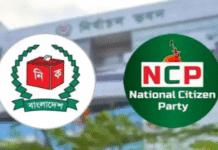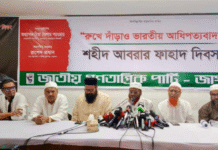Nikkei Asia
Human rights groups decry ‘farce’ as Chinese state media applauds Phnom Penh

Cambodian Prime Minister Hun Sen shakes hands with a supporter after voting at a polling station in Kandal province on July 23. (Photo by Ken Kobayashi)
PHNOM PENH — The U.S. says it has taken steps to impose sanctions on individuals and cut aid in response to Cambodia’s national election on Sunday, which Prime Minister Hun Sen’s ruling party won in a landslide after his most credible rivals were disqualified.
U.S. State Department spokesman Matthew Miller said the ballot, in which the ruling Cambodian People’s Party won 120 of 125 parliamentary seats, according to preliminary results, was “neither free nor fair.” Several speakers at a news conference hosted by the regional group ASEAN Parliamentarians for Human Rights on Monday echoed the condemnation.
Electoral authorities barred the Candlelight Party, the CPP’s only credible opponent, from contesting the election in May. Its supporters faced intimidation and arrests ahead of the ballot.
Miller said the Cambodian authorities engaged in a “pattern of threats and harassment against the political opposition, media and civil society.” He said this “undermined the spirit of the country’s constitution and Cambodia’s international obligations.”
“These actions denied the Cambodian people a voice and a choice in determining the future of their country,” Miller said.
“In response, the United States has taken steps to impose visa restrictions on individuals who undermined democracy and implemented a pause of certain foreign assistance programs.”
The U.S. did not release further details about the individuals or programs targeted. Its statement left the door open to cooperation but called on the CPP to stop its authoritarian shift.
“As the ruling Cambodian People’s Party forms a new government, authorities have an opportunity to improve the country’s international standing, including by restoring genuine multiparty democracy, ending politically motivated trials, reversing convictions of government critics, and allowing independent media outlets to reopen and function without interference,” the statement said.
Hun Sen, who has ruled for 38 years, is expected to soon transfer power to his military general son, Hun Manet, who appeared to have won a seat in Phnom Penh on Sunday.
As of 8 a.m. on Monday, with 98% of polling stations reporting, the CPP had won 82% of votes, followed by FUNCINPEC with 9%, according to Cambodian data portal Kamnotra.
FUNCINPEC will take five seats in the national assembly, the provisional results show. The royalist party co-governed with the CPP in the 1990s. Using military force, Hun Sen ousted them from the power-sharing agreement in 1997. After largely falling into political irrelevance, this will be the first time they have been elected to parliamentary seats since 2008.
The number of invalid votes accounted for 5.7%. Exiled opposition members had encouraged voters to intentionally spoil their ballots in protest. This riled Hun Sen, who threatened legal consequences.
The strongman’s closing of Cambodia’s political space after he almost lost an election in 2013 has been helped by his deepening ties with China, Cambodia’s most important source of investment, military aid and diplomatic support.
In an article released on Sunday, China’s nationalist tabloid the Global Times said the election result was expected to “lay a solid foundation for the stability and further development of future China-Cambodia relations,” calling their ties an “unbreakable friendship.”
Human rights experts, meanwhile, denounced what they called a “farce of an election.”
Charles Santiago, co-chairperson of ASEAN Parliamentarians for Human Rights, told reporters on Monday that the disqualification of the Candlelight Party and the threats and attacks on opposition members was “the same story repeating itself.” The CPP won all seats in the previous 2018 election after the country’s compliant judiciary dissolved Candlelight’s predecessor, the Cambodia National Rescue Party, which had won almost half the votes in 2013.
Santiago, a former Malaysian lawmaker, said the establishment deployed all of Cambodia’s institutions to ensure the CPP’s victory. “It is a clear-cut conspiracy by the elite to win elections by fraudulent means,” he said.
Chandanie Watawala, executive director of the Asian Network for Free Elections (ANFREL), said the group did not send observers to avoid legitimizing the vote.
Cambodian authorities pointed to the participation of around 90,000 local and 586 international observers to support its claim that the election was run fairly. But Watawala said that these observers were not credible, and that the domestic ones were largely CPP supporters deployed to intimidate voters.
Phil Robertson, Human Rights Watch’s deputy Asia director, said that the election and the preceding campaign contained a “slew of human rights abuses,” and that the international community needs to “get tough” on Cambodia’s longtime leader. Hun Sen, he said, had made it clear he would tolerate no political opposition as he prepares to hand power to his son.
“What I call this is the Hun Sen boxing alone phenomenon,” Robertson said. “Hun Sen doesn’t want to have a serious opponent in the ring with him in these elections so he manufactures reasons and crises to cause the main opposition party to be barred, and that is what happened.”










